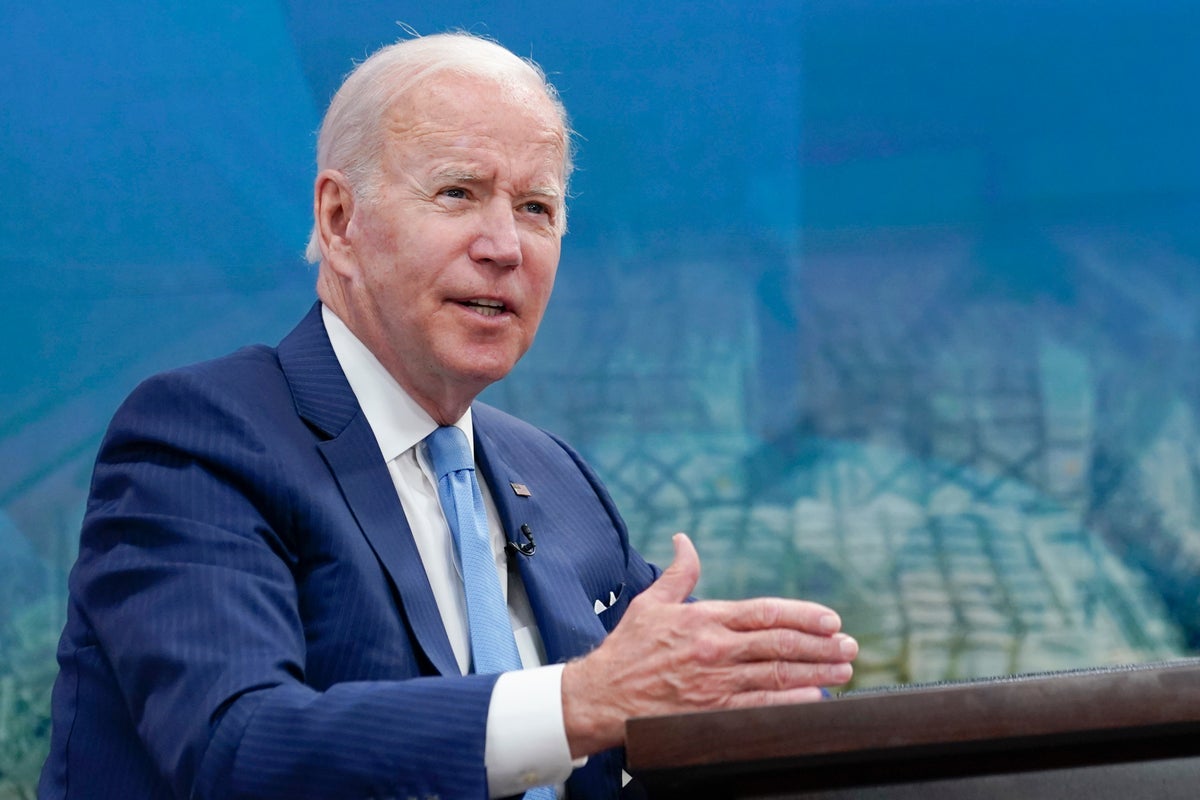
President Joe Biden will deliver primetime remarks on 2 June to address recent mass shootings and underscore the “need for Congress to act to pass common-sense laws to combat the epidemic of gun violence” following recent massacres in Tulsa, Oklahoma, Uvalde, Texas, and Buffalo, New York.
His address, announced by the White House on Thursday afternoon, will air at 7.30pm EST.
White House Press Secretary Karine Jean-Pierre said Mr Biden will “renew his call for action to stop the epidemic of gun violence that we've seen in Uvalde, and in Tulsa, and in Buffalo in just a few short weeks and in too many communities across the country”.
“We see gun violence tearing up our communities, tearing up families, and so reducing gun violence has been a top priority of this president since his first day of office, and throughout his career as a senator as a vice president, and clearly as a president,” she said.
Ms Jean-Pierre added that Mr Biden “has been crystal clear” about the need for Congress to act and revealed that he has directed White House staff to “continue to explore” whether he can take additional actions to stem the tide of gun violence through executive action.
“We can't do this alone and it's time for Congress to act,” she said.
Ms Jean-Pierre also told reporters the White House legislative affairs team has been in “close contact” with members of Congress since a gunman used an AR-15 rifle to kill 10 people at a Buffalo, New York supermarket, and has conducted “dozens of phone calls” with Congressional leadership, with members of the House and Senate committees with jurisdiction over gun legislation, and with the House and Senate members who are currently negotiating a bipartisan legislative package to address the recent killings.
She added Mr Biden “has been encouraged” by what he has seen take place on Capitol Hill so far, and said his remarks Thursday evening would be focused on “making sure ... the American people know that he is still continuing to speak on their behalf and making sure that ... we get some action taken”.
Mr Biden has long been a champion of stricter laws governing the possession and sale of military-style weapons such as the AR-15, and was a chief sponsor of the assault weapons ban which prohibited the sale of such rifles from 1994 to 2004.
After visiting Uvalde to mourn with the community there in the wake of last week’s killings of 19 children and two teachers at Robb Elementary School, the president told reporters on Sunday that “it makes no sense” that the gunman could purchase high-powered firemarms capable of firing hundreds of devastating rounds.
“There’s simply no rational basis for it,” he said. “The Second Amendment was never absolute.”
On Monday, he pointed to the now-expired federal assault weapons ban which Congress enacted after mass shootings in California and Texas in 1989, 1991 and 1993.
“I know what happened when we had rational action before,” the president said. “I think things have gotten so bad that everybody’s getting more rational about it ... At least, that’s my hope and prayer.”
His remarks on Thursday will come one day after a gunman killed four people at a medical complex in Tulsa, and just over a week after the Ulvade killings on 24 May, and two weeks after the racist massacre of 10 Black people at a grocery store in Buffalo.
The president’s address also follows a House Judiciary Committee debate over a package of legislation billed as an emergency response to the killings.
The Protecting Our Kids Act proposes raising the age to legally purchase so-called assault weapons like the AR-style rifles used in recent massacres from 18 to 21 years old. It also would target large-capacity magazines and the proliferation of “ghost guns”. It does not include an assault weapons ban.
The legislation is likely to pass the Democratically controlled House of Representatives as early as next week but is expected to face Republican obstruction in the deadlocked Senate.
“How are we okay with this as a nation? Is this status quo that we all accept?” Democratic US Rep Lucy McBath asked the committee on Thursday.
Ms McBath, whose 17-year-old son was killed while parked in his car in Jacksonville, Florida, said that “an entire generation of children are learning that the adults they look up to cannot or will not protect them.”
Over the Memorial Day weeked in the wake of the massacre in Uvalde, there were at least 14 more mass shootings across the US, leaving at least nine people dead and more than 60 injured.
A tracking of mass shootings from the Gun Violence Archive – which defines a mass shooting as an incident in which “four or more people are shot or killed, not including the shooter” – shows that there have been 230 mass shootings in 34 states and Washington DC within the first 150 days of the year.
The organisation reports that at least 156 people were killed and 412 were injured in all gun-related violence over the Memorial Day weekend.
The recent killings have also galvanised state legislators and officials to draft new gun control legislation in their respective states. New York Governor Kathy Hochul and Democratic leadership in the state legislature introduced 10 bills to “tighten New York’s gun laws, close loopholes and directly address the gaps in our laws exposed by the horrific shootings” in Buffalo and Uvalde, the governor announced on Tuesday.
The bills would make threats of mass shootings a crime; create a taskforce for online extremism and requirs social media platforms to provide “clear and concise” policies for responding to hateful conduct; ban the sale of bulletproof vests for people who are not in law enforcement; and require a license to buy all semi-automatic rifles, among other measures.







